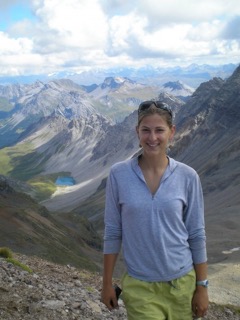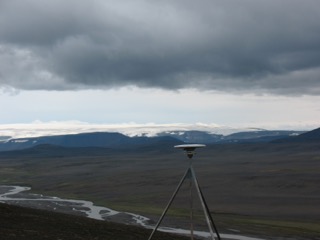2 March 2015
You can hide under your desk … as long as you still answer the phone
Posted by mcadams
By Kathleen Compton
“Well, if you need me I’ll be hiding under my desk,” I told my adviser on Friday afternoon.
I’d just finished a 20-minute phone call with PRI (Public Radio International)’s The World.

Kathleen Compton, a PhD candidate at the University of Arizona, gave a handful of media interviews in early February about her recently-published paper on glacial rebound in Iceland. Photo courtesy of Kathleen Compton.
Responding to press inquiries is hard, and a morning of staring intently though the clutter on my desk wracking my brain for simple, concise answers to unexpected questions had left me feeling ragged. It had been just over 24 hours since the University of Arizona’s public information office had co-issued a press release with AGU about my recent paper on Icelandic glacial rebound, which was published in Geophysical Research Letters, and I’d spent all day Thursday and all of Friday morning answering emails and phone calls from reporters.
On paper, I am well-prepared for this sort of science communication. I’ve supplemented my course work with a science journalism class, and I’ve participated in (and led) several communications workshops. As the AGU Public Affairs Intern last spring, I helped guide scientists communicate with policy makers. But this was my first time interacting with the press and really putting into practice the skills I’ve been working to build.
There were definitely some things that knocked me off balance, and a few instances when I wished I’d prepared myself better. So now that the flurry of activity is over, but before I forget everything, I’ve made myself a reminder list that I can revisit if (and hopefully when!) my research gets picked up by the press again. Hopefully you find this helpful too, and please add additional tips in the comments section!
1. Journalists don’t ask the same kinds of questions that scientists do
You are not likely to hear your colleague ask, “So, is this a good thing or a bad thing?” If you listen to the PRI interview, you’ll hear my hesitance in answering that very question, and I ended up punting the question. Don’t forget, you don’t have to answer questions that you don’t want to or ones that make you uncomfortable. If you can, find a way to redirect.
2. Practice; you’ll wish you had
The news cycle is quick. Our news release went online on Thursday morning, and by Friday afternoon the inquiries had all but stopped. I found myself thinking, “Wait! No! I finally feel comfortable with my messaging! Someone please call me, I have good answers now!” I had a few opportunities to work with my PIO* to identify the main points about my research to convey to reporters but I wish I’d practiced more. Have a friend call you so you can practice your answers over the phone. Don’t just think about what you would say, actually practice saying it out loud. Also, find one really good analogy and don’t be bashful about using it over and over again.
*PIO = Public Information Officer. If you’re on a university campus, and you don’t know who yours is, find out!

Compton used 62 GPS receivers, such as the one in this photo, to track the movements of Earth’s crust in Iceland. Compton received press inquiries after the University of Arizona and AGU co-issued a press release about her Icelandic research, which was published in a Geophysical Research Letters paper in early February. Photo Credit: Richard A. Bennett/University of Arizona Department of Geosciences.
3. You can’t control everything
I like to be in control; I (like all of us do) chose the words for my journal article very carefully. So it was hard for me to see news articles pop up with words I didn’t like or wouldn’t have used. For me, reading those articles was a practice in letting go. Unless the article is factually incorrect, or the author has misquoted you, there’s not much you can do. Someone else is at the helm. It’s your research, but it’s their article.
My favorite article title: “Iceland is melting so fast, it’s literally popping off the planet” …Literally…sigh.
4. You can hide under your desk…
…or barricade yourself in your office, or take over the empty conference room down the hall. Find somewhere comfortable and quiet. Then, answer the phone, do your best, and make sure to have the chocolate bar unwrapped and waiting for you as a reward at the end of yet another interview. You can do it!
– Guest blogger Kathleen Compton is a PhD candidate at the University of Arizona. She uses GPS (the same technology used by smart phone map apps) to better understand the relationship between climate, glacial melt, and the Earth’s glacial rebound response in Iceland. When she’s not in the lab, you’ll find her atop her mountain bike exploring the trails of the Tucson desert.


 The Plainspoken Scientist is the science communication blog of AGU’s Sharing Science program. With this blog, we wish to showcase creative and effective science communication via multiple mediums and modes.
The Plainspoken Scientist is the science communication blog of AGU’s Sharing Science program. With this blog, we wish to showcase creative and effective science communication via multiple mediums and modes.
Thank you for this great insight into the perspective of the scientist when facing media following a press release. This is valuable in helping other scientists to prepare. I’m particularly interested in how scientists communicate and how they experience the communication encounters – topic of my PhD study at Stellenbosch University.